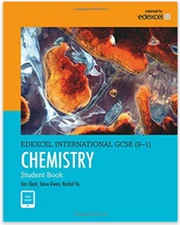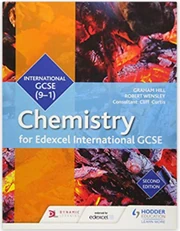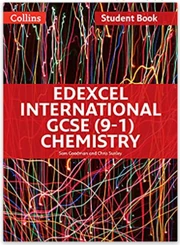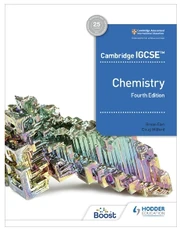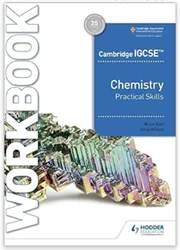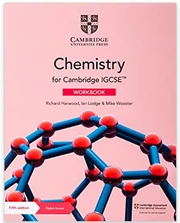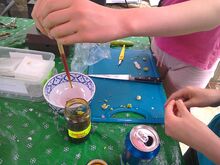
Most home-ed students take International GCSE (IGCSE) chemistry exams, which consist of written exams only. Unlike GCSEs, IGCSEs do not require core practical work to be carried out in the exam centre.
Cambridge (CAIE) and Edexcel IGCSE Chemistry are exam-only syllabuses and are available to private candidates.
Other relevant pages:
Science - this page gives a general overview of your options for GCSE/IGCSE Level Science.
Science A levels (includes information on practical endorsements for A level)
Alternative Qualifications (see Science and Engineering section)
Chemistry - FAQ[]
Can I do GCSE Chemistry?[]
For most home educators, GCSE Chemistry is not an option and they must do IGCSE. GCSE chemistry does not have a practical exam, BUT the head of the exam centre has to sign a form for each candidate saying that the candidate has been offered the opportunity to carry out all core practicals at the centre. Most centres won't do this for external candidates.
Do I need to complete practicals for IGCSE Chemistry?[]
Although there is no practical exam in IGCSE Chemistry, an understanding of practical work is necessary. Both specifications have a list of core practicals that the candidate is required to understand, but no form has to be signed to say these have been done/observed making the specifications easier for private candidates to access. IGCSE chemistry specifications have 'alternative to practicals' questions as part of the written exam papers. Carrying out practicals will help with understanding but it is not a requirement, videos can be found of most experiments - the Chemistry Practicals page has ideas and support.
Edexcel International GCSE Chemistry[]
This is a popular choice among home educators, as it is often easier to find an exam centre in the UK for Edexcel exams.
Edexcel International GCSE Chemistry page and specification
- Exams from: June 2019
- Available in June and November
- Specification code: 4CH1
Subject Content[]
The Edexcel International GCSE Chemistry has 4 topics:
- Principles of chemistry
- Inorganic chemistry
- Physical chemistry
- Organic chemistry
Assessment[]
100% exam based.
- Paper 1 - 2hrs - 110 marks - 61.1%
- A mixture of different question styles, including multiple-choice questions, short-answer questions, calculations and extended open-response questions.
- Will include questions about practicals
- Covers topics 1- 5 but only the content that is listed in the syllabus not in bold
- Can use a calculator
- Paper 2 - 1hr 15 minutes - 70 marks - 38.9%
- A mixture of different question styles, including multiple-choice questions, short-answer questions, calculations and extended open-response questions.
- Will include questions about practicals
- Covers topics 1- 5 all content listed in syllabus (bold and not bold)
- Can use a calculator
Resources[]
If you are not sure what textbooks or revision books to buy, or where to find answers, please ask on the HE exams and alternatives group You only need one student textbook and one is not better than the others, it is personal preference.
Exam App is great for revision. Covers entire curriculum for Chemistry, Biology, Physics and Maths. Discount for Home Educators on AWE Discounts.
Student Textbooks for Edexcel IGCSE Chemistry
(Pearson)Edexcel IGCSE chemistry student book by Jim Clark (2017). Some people find the layout a little cluttered in this recent Pearson's edition, so check out the 'look inside' feature on Amazon of this and other textbooks to compare. Answers are here.
(Hodder) Edexcel International GCSE Chemistry Student Book Second Edition (2017). Answers are here.
(Collins) Edexcel International GCSE Chemistry Student Book (2017) by Sunley. Answers might not be provided for the exam-style questions. Collins are usually helpful when home educators email them for a copy of the answers, but perhaps check on the HE Exams and Alternatives group, first to see if anyone has the answers.
Practical workbook
Edexcel International GCSE (9-1) Chemistry Student Lab Book: Exam practice and further application (2019) Not essential, but some families have found it helpful
Workbooks and Revision books for Edexcel IGCSE Chemistry
Revision books and workbooks aren't essential, but some students find them helpful. There are lots of options below and you don't need to buy all of them!
Hodder
(Hodder) Edexcel International GCSE Chemistry Workbook (2017) by Wensley Answers are here.
My Revision Notes: Edexcel International GCSE (9–1) Chemistry (2018) by Dixon
CGP
Some people find CGP revision books cluttered, and other people love them. Take a look on the 'look inside' feature of Amazon to see whether they will suit your child.
Grade 9-1 Edexcel International GCSE Chemistry: Revision Guide with Online Edition (2017) designed for revision, but can also give a useful overview of each topic as it is being studied.
Grade 9-1 Edexcel International GCSE Chemistry: Exam Practice Workbook (includes Answers) (2017) A workbook to accompany the above revision book. Can be useful for testing knowledge before progressing to whole exam papers.
Grade 9-1 Edexcel International GCSE Chemistry: Complete Revision & Practice with Online Edition (2107) This book combines the CGP revision guide with some questions (fewer questions than if buying the exam practice workbook). There might be some overlap with the above books.
Edexcel International GCSE Chemistry: Grade 8-9 Targeted Exam Practice Workbook (with answers) (2017) questions for students aiming for the top grades.
New Grade 9-1 Edexcel International GCSE Chemistry: Revision Question Cards (2019) Note these are NOT flash cards of topic summaries, but are question cards. Not essential, but might be useful for some students.
Grade 9-1 Edexcel International GCSE Chemistry: 10-Minute Tests (with answers) (2018) Again, not essential, but a possible tool for some students.
Cambridge (CAIE) IGCSE Chemistry[]
Cambridge offer 2 IGCSEs in Chemistry from 2019. The difference is in the grading, 0971 being 9-1 and 0620 being A*-G, otherwise the syllabus is identical. Some exam centres will only enter students for 0971.
CAIE International GCSE Chemistry (0971) page and specification
CAIE International GCSE Chemistry (0620) page and specification
0971 was new in 2019, any tweaks to 0620 at the same time look to be minor so papers from pre-2019 will still be useful.
- Exams from: 2019
- Available in Autumn and Summer series
- Specification code: 0971 (9-1) or 0620 (A*- G) There are amendments to the specification for exams from 2023, some content is being removed and other content added.
Subject Content[]
Candidates study the following topics (taken from 2022 spec):
The particulate nature of matter, experimental techniques; atoms, elements and compounds, stoichiometry, electricity and chemistry, chemical energetics, chemical reactions, acids, bases and salts, the Periodic Table, metals, air and water, sulfur, carbonates and organic chemistry
Cambridge Chemistry is 'tiered' students enter for core (which allows them to achieve grade 5-1) or extended (which allows them to achieve grade 9-1). Those doing Core just need to study the core content, those doing Extended need to study the core and supplementary content.
Assessment[]
The specification has three papers: a 1h Alternative to Practical, a 45 min Multiple Choice and a 1 hr 15 Theory paper. The multiple choice and theory exams used to be taken back to back (so effectively 2 hours), but for the past two years have been examined on separate days.
CAIE science IGCSEs are tiered. This means that less able students can opt for the core tier, (papers 1, 3 and 6) but can only get a maximum grade of C or 5. More able students can opt for the higher (extended) tier (papers 2, 4 and 6) with the grade range of 9-1.
100% exam based.
- Paper 1 (core) or 2 (extended) - Multiple choice - 45 mins - 40 marks - 30%
- Forty compulsory multiple-choice questions
- Covers all content
- Paper 3 (core) or 4 (extended) - Theory - 1hr 15 minutes - 80 marks - 50%
- Short-answer and structured questions
- Covers all content
- Paper 6 - (sat by both core and extended) - Alternatives to Practical - 1hr - 40 marks - 20%
- Questions will be based on the experimental skills outlined in Section 4 of the specification.
Resources[]
Some books include answers, others don't. Some publishers will provide links to answers if you contact them. If you are not sure what textbooks or revision books to buy, or where to find answers, please ask on the HE exams and alternatives group ]
There are new books available for exams from 2023 because of spec changes, 2022 are also listed
Student Textbooks
For Exams from 2023
(Hodder) Cambridge IGCSE Chemistry 4th Edition (2021) by Earl and Wilford
(Collins) Cambridge IGCSE™ Chemistry Student's Book (2021) By Sunley
(Cambridge University Press) Cambridge IGCSE™ Chemistry Coursebook with Digital Access (2 Years) (2021) by Harwood and Lodge
(Oxford University Press) Complete Chemistry for Cambridge IGCSE Student Edition (2020) by Gallagher and Ingram
For 2022 exams
(Oxford University Press) Complete Chemistry for Cambridge IGCSE (2016) By Gallagher and Ingram
(Cambridge University Press) Cambridge IGCSE® Chemistry Coursebook with CD-ROM (2014) By Harwood and Lodge
(Collins) Cambridge IGCSE™ Chemistry Student's Book (2014) By Sunley
(Hodder) Cambridge IGCSE Chemistry 3rd Edition (Book & CD) (2014) by Earl and Wilford
Revision books and workbooks
Revision books and workbooks aren't essential, but some students find them helpful.
For Exams from 2023
(Cambridge University Press) Cambridge IGCSE |Chemistry Workbook with Digital Access (2 Years) (2021) by Harwood et al.
(Oxford University Press) Cambridge IGCSE® & O Level Complete Chemistry: Workbook Fourth Edition. (2021) by Norris.
(Oxford University Press) Cambridge IGCSE (R) & O Level Chemistry: Exam Success. (2021) by Ryan and Norris.
(Hodder) Cambridge IGCSE Chemistry Workbook (2021) by Earl and Wilford.
(Hodder) Cambridge IGCSE Chemistry Practical Skills Workbook (2021) by Earl and Wilford.
(CGP) Cambridge International GCSE Chemistry Complete Revision & Practice (2021)
For 2022 exams
(Hodder) Cambridge IGCSE® Chemistry Revision Guide (2015) by Norris.
(Oxford University Press) Complete Chemistry for Cambridge IGCSE Student Book & Revision Guide Pack (2020) The revision book in this link is sold as part of a bundle, however it might be available separately.
(Cambridge University Press) Cambridge IGCSE® Chemistry Maths Skills Workbook (2018) by Harden.
Past papers
Past papers can be found on the specification pages or sites such as pastpapers.co and papacambridge. Each series of 0620 (besides the March series - which is only sat in India) has 3 sets of papers available. These are because they were sat in different time zones. They are the same syllabus and useful for practice. You can use both 0971 and 0620 papers to practice either spec. There are a couple of subtopics being dropped from 2023 exams, and a few extra added but papers from before will still be useful.
Practical Work[]
Doing some practicals at home will be useful for answering the practical questions in the exam. IGCSE exams contain questions about equipment, experiment design, and procedures, as well as safety and general scientific methodology, such as controlling variables.
Please see our page Chemistry Practicals about doing chemistry experiments from home. It includes information on obtaining supplies and hints and tips. There are many practicals on the GCSE and IGCSE syllabus which can easily be carried out at home.
Note that the practical components of Edexcel and CAIE syllabuses for single sciences are very similar, so you can use resources for either.
General Resources[]
Seneca Learning - A free online learning platform
IGCSE Science Courses - by Graham Bray. Videos cover each of the 3 sciences and CIE and Edexcel Boards. Discounted subscription often available to home educators (ask on the HE exams and alternatives group.)
Priority Learning - free worksheets and revision resources
Pinterest board on IGCSE Chemistry compiled by one of our members.
Distance Learning
Many home-educated students study Chemistry successfully using just the textbook and free online resources, but some find a distance learning course suits their family better, or want to use a tutor occasionally for marking essays or past papers. Course providers can be found on the Distance Learning Providers page.

